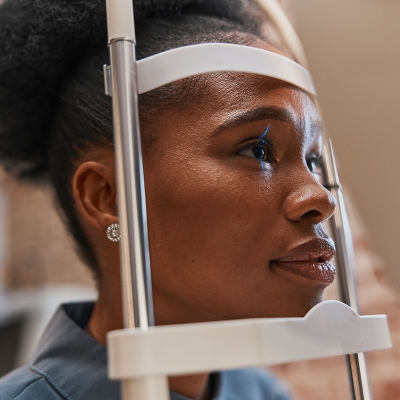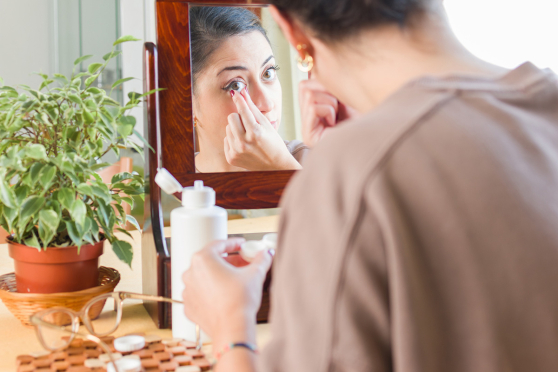Give your eyes a break
Your eyes need a little R&R too. Find out what to do when they burn, water or just feel tired.

This article is part of UnitedHealthcare Vision’s Healthy Vision Challenge. Taking care of your eyes is critical to your overall health and wellness. It’s smart to be thinking about the quality of your vision all the time, not just when your eyes are bothering you or your experiencing changes. If you can make these behaviors part of your everyday routine, you could have healthier eyes for life.
Your eye muscles can tell you when they need a time-out. Anytime they feel dry, itchy or like there’s something in there, they’re basically begging for a break.1 It’s up to you to pay attention.
A major reason for this eye discomfort is screens. “One of the first questions I ask patients is: How much time do you spend on a screen?” says Jen Wademan, O.D., an optometrist in Folsom, California.
Typically, people spend at least 26 hours a week looking at a screen — and that’s just during leisure time.2 It doesn’t include 7 hours a day at work, where you might also be looking at a computer for most of the day.3
Staring at a screen forces your eyes to focus a specific way. “Our entire computer and phone world is up close. As a result, we don’t use our distance vision as much,” Wademan explains. That’s why many of her patients experience eye fatigue and strain, she adds.
Eye doctors call this type of eye issue digital eyestrain or computer vision syndrome. It can dry out your eyes, making them burn and water and it can also give you headaches and blurry vision.
Does that sound like you? Here’s how to give your eyes a rest.
Need new glasses? In 3 easy steps, you could have a new pair on the way. Check your vision coverage, select your favorite frames, then check out. Done!
Change your focus
“Any time you focus your eyes, you’re activating your eye muscles. That’s like being at the gym and exercising your arm or leg muscles,” says Wademan. And just like resting in between sets of bicep curls or leg extensions, you need to do the same for your eyes.
One easy way? Look up from your device and gaze across the room or outside the window. “When you look far away, your muscles can release. This is considered a resting position for your visual system,” Wademan says. Do this every half hour or so.
Get up and move
Give your eyes a break by taking one yourself. Walk to the kitchen and get some water. Go for a 5- or 10-minute stroll outside. That will force your eyes away from your device or any close-up work you might be doing, and you’ll be moving your body.
Turns out, physical activity benefits your eyes along with your heart. Exercise may protect against eye diseases such as age-related macular degeneration and glaucoma.4 Plus, the minutes you spend walking the hallways at work or around the block can add up.
Just blink
One of the simplest ways to help your eyes is to blink.5 Blinking your eyes mindfully can get you in the habit of blinking more often overall.
Blinking keeps your eyes moist by replenishing your tears. When you are working or scrolling on your device, you don’t blink as often. That’s why too much screen time leads to dry eyes — and eyestrain.6
When you blink mindfully, it’s like yoga for your eyes. Try the following: Close your eyes completely. Breathe in. Open your eyes as you breathe out. Repeat a couple of times. Since it’s almost impossible to remember to blink, set a reminder to do this every hour or so.
Get special glasses
If you work on the computer, talk to your optometrist about glasses with computer progressive or anti-fatigue lenses, says Wademan. Both are designed to help your eyes focus on a screen that’s 20 to 30 inches away, which can reduce eyestrain, she adds.
If you wear glasses already, go for lenses that help cut down the glare reflected off the screens. These lenses are also easier on your eyes, notes Wademan.
Giving your eyes regular time-outs during the day means you’ll be taking them too. You and your eyes will feel more rested, no matter what your schedule has in store.
Ready to ditch your glasses or contacts and go for LASIK? Get more info on LASIK surgery now.
Sources:
- Digital Eye Strain — A Comprehensive Review Ophthalmology and Therapy, October 2022.
- Recreational Screen Time Behaviors during the COVID-19 Pandemic in the U.S.: A Mixed-Methods Study among a Diverse Population-Based Sample of Emerging Adults Journal of Environmental Research and Public Health, May 2021.
- Computer vision syndrome American Optometric Association
- Voluntary Exercise Suppresses Choroidal Neovascularization in Mice Investigative Ophthalmology & Visual Science, May 2020
- Effects of yogic eye exercises on eye fatigue in undergraduate nursing students Journal of Physical Therapy Science, June 2016.
- The Relationship Between Dry Eye Disease and Digital Screen Use Clinical Ophthalmology, November 2022.


